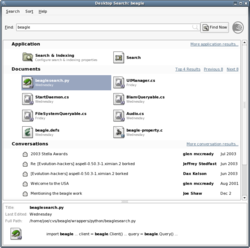| Beagle | |
|---|---|
 | |
 A screenshot of Beagle's UI | |
| Developer | Beagle Team |
| Final release | 0.3.9 / January 26, 2009 |
| Repository | |
| Written in | C# |
| Operating system | Linux, other Unix and Unix-like systems |
| Type | Search tool |
| License | A mix of the X11/MIT License and the Apache License |
| Website | www |

Beagle is a search system for Linux and other Unix-like systems, enabling the user to search documents, chat logs, email and contact lists. It is not actively developed. [1]
Contents
Beagle grew out of Dashboard, [2] an early Mono-based application for watching and presenting useful information from a user's computer. It is written in C# using Mono and uses a port of Lucene to C# called Lucene.Net as its indexer. Beagle includes a Gtk#-based user interface, and integrates with Galago for presence information.
Beagle was developed and maintained by Joe Shaw with help from the open source community. Notable contributors included Jon Trowbridge, Robert Love, Nat Friedman and David Camp.